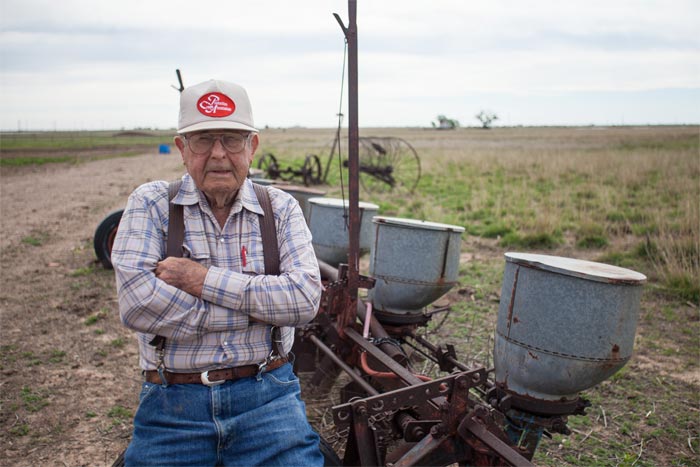
For 52 years, O.H. Price has remained a Capital Farm Credit customer.
Photo by: Russell Graves
Longtime farmer O.H. Price has a few words of wisdom for beginning farmers and ranchers.
“My advice to young people getting into agriculture is to get a good lender that will back you,” he says. “I could never have what I have today if it wasn’t for the backing of Farm Credit.”
At age 93, the Pampa, Texas, hay producer offers his recommendation based upon 52 years of experience financing with the same lender, Capital Farm Credit, which has seen him through drought, storms and economic downturns.
Tough Times
Price recalls a time when credit was not so readily available.
Born in 1921, he grew up on a 140-acre farm in the Missouri Ozarks. While the family farm was considered sizable, only six acres were tilled, because the remaining ground was covered in timber or rocks. Plowing the land at the rate of one acre a day with a horse-drawn one-bottom plow was hard work.
“During the Great Depression, I don’t know how people in town got food. On the farm we didn’t have much,” he says, “but at least we had a milk cow and some chickens and pigs and a garden. We could grow our own food.”
Toward the end of the Depression, Price worked as a Civilian Conservation Corps surveyor in Iowa, terracing erodible farmland. He returned to high school before joining the Army and serving as an aircraft mechanic during World War II.
Afterward, he moved to Chama, N.M., and eventually landed in Pampa in 1951. There, at age 30, he got a job as a truck driver — a vocation that he continued for 40 years.
To build a better life for his wife and five children, he turned to farming in 1961. Starting as a custom hay cutter, he rented 100 acres of land and transitioned into growing and selling hay to local ranchers, while he built up his land and equipment inventory.
“I started with a $300 H Farmall tractor, a plow, a mower and two or three other pieces of equipment that I borrowed,” he says.
A Faithful Patron
At first, a local bank financed Price’s agricultural startup, but in 1963, he turned to Canadian Production Credit Association (PCA) — now known as Capital Farm Credit — for his operating credit. He has been a faithful patron of the lender’s Pampa branch office ever since.
“You can’t beat the deal they gave me,” he says. “Where (else) can you borrow money and get a dividend? I couldn’t find loan terms like theirs anywhere.”
“We’ve enjoyed watching Mr. Price expand his operation over the years,” says Kim Ballard, Capital Farm Credit customer relationship specialist, who has worked with him for 25 years. “After he’d pay off an operating loan, he’d take his profits and purchase another piece of land.”
Price says he steadily built his operation by controlling his expenses and setting money aside. Through it all, he’s seen his share of difficulties, such as the marginal farm economy of the 1980s. However, the income he earned by putting much of his land into the Conservation Reserve Program helped him to ride out the tough times. During the recent prolonged drought, he made ends meet by not growing anything at all — a strategy made possible by his lifelong financial diligence.
Cutting Back
Predictably, Price has reduced his farming operations in recent years. Now he grows red-top cane hay on only a fraction of his property, while his son and grandson pasture cattle on the remaining land.
Thankful for what he has and for Capital’s continued support, Price still stops by the lender’s Pampa office once a month.
“Mr. Price is like part of the family,” says Ballard. “But that’s how it is in Farm Credit. It’s never that stereotypical banking relationship.”